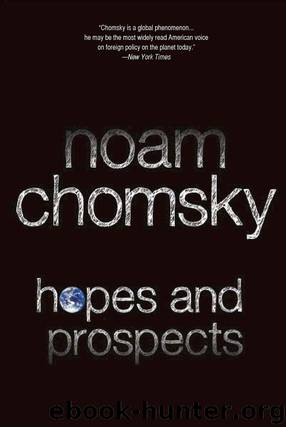Hopes and Prospects by Noam Chomsky

Author:Noam Chomsky
Language: eng
Format: mobi, epub
Tags: Writing, Non-fiction, Philosophy, Politics, History
ISBN: 9781931859967
Publisher: Haymarket Books
Published: 2009-01-02T00:00:00+00:00
Turning Point?
The Obama-Netanyahu-Abbas meetings in May 2009, followed by Obama’s speech in Cairo, have been widely interpreted as a turning point in U.S. Middle East policy, leading to consternation in some quarters, exuberance in others. Fairly typical is Middle East analyst Dan Fromkin of the Washington Post, who sees “signs Obama will promote a new regional peace initiative for the Middle East, much like the one championed by Jordan’s King Abdullah…[and also] the first distinct signs that Obama is willing to play hardball with Israel.”1 A closer look, however, suggests reservations.
King Abdullah insists that “There is no change to the Arab Peace Initiative, and there is no need to amend it. Any talk about amending it, is baseless.”2 Abbas, the U.S. favorite and regularly described as the president of the Palestinian Authority (his term expired in January 2009), firmly agreed. The Arab Peace Initiative reiterates the long-standing international consensus that Israel must withdraw to the international border, perhaps with “minor and mutual adjustments,” to adopt official U.S. terminology before it departed sharply from world opinion in 1971, endorsing Israel’s rejection of peace with Egypt in favor of large-scale settlement expansion (then in the northeastern Sinai)—a fateful decision, granting expansion priority over security, and firming up Israel’s dependence on the United States. Furthermore, the consensus calls for a Palestinian state to be established in united Gaza and the West Bank after Israel’s withdrawal. The Arab Peace Initiative adds that the Arab states should then normalize relations with Israel. The initiative was later adopted by the Organization of Islamic States, including Iran,3 which had already indicated its willingness to go along with this plan.
Obama has praised the initiative and called on the Arab states to proceed to normalize relations with Israel, scrupulously evading the core of the proposal: reiteration of the international consensus.4 His studied omission can only be understood as implicit reiteration of the U.S. rejectionist stand that has blocked a diplomatic settlement since the 1970s along with its Israeli client, in virtual isolation, with rare and temporary—and highly instructive—exceptions. There are no signs that Obama is willing even to consider the Arab Peace Initiative, let alone “promote” it. That was underscored in Obama’s much heralded address to the Muslim world in Cairo on June 4, 2009, to which I will return.
The U.S.-Israel interactions—with Abbas on the sidelines—turn on two phrases: “Palestinian state” and “natural growth of settlements.” Let’s consider these in turn.
Obama has indeed pronounced the words “Palestinian state,” echoing Bush. In contrast, the (unrevised) 1999 platform of Israel’s governing party, Netanyahu’s Likud, “flatly rejects the establishment of a Palestinian Arab state west of the Jordan river.” The Bush-Obama position could, therefore, be understood as “hardball,” if it meant anything. And it is also useful to recall that it was Netanyahu’s 1996 government that was the first in Israel to use the phrase “Palestinian state.” It agreed that Palestinians can call whatever fragments of Palestine are left to them “a state” if they like—or they can call them “fried chicken.”5
The
Download
This site does not store any files on its server. We only index and link to content provided by other sites. Please contact the content providers to delete copyright contents if any and email us, we'll remove relevant links or contents immediately.
The Secret History by Donna Tartt(19083)
The Social Justice Warrior Handbook by Lisa De Pasquale(12190)
Thirteen Reasons Why by Jay Asher(8907)
This Is How You Lose Her by Junot Diaz(6885)
Weapons of Math Destruction by Cathy O'Neil(6279)
Zero to One by Peter Thiel(5799)
Beartown by Fredrik Backman(5751)
The Myth of the Strong Leader by Archie Brown(5507)
The Fire Next Time by James Baldwin(5441)
How Democracies Die by Steven Levitsky & Daniel Ziblatt(5218)
Promise Me, Dad by Joe Biden(5153)
Stone's Rules by Roger Stone(5087)
A Higher Loyalty: Truth, Lies, and Leadership by James Comey(4959)
100 Deadly Skills by Clint Emerson(4924)
Rise and Kill First by Ronen Bergman(4788)
Secrecy World by Jake Bernstein(4751)
The David Icke Guide to the Global Conspiracy (and how to end it) by David Icke(4717)
The Farm by Tom Rob Smith(4506)
The Doomsday Machine by Daniel Ellsberg(4489)
